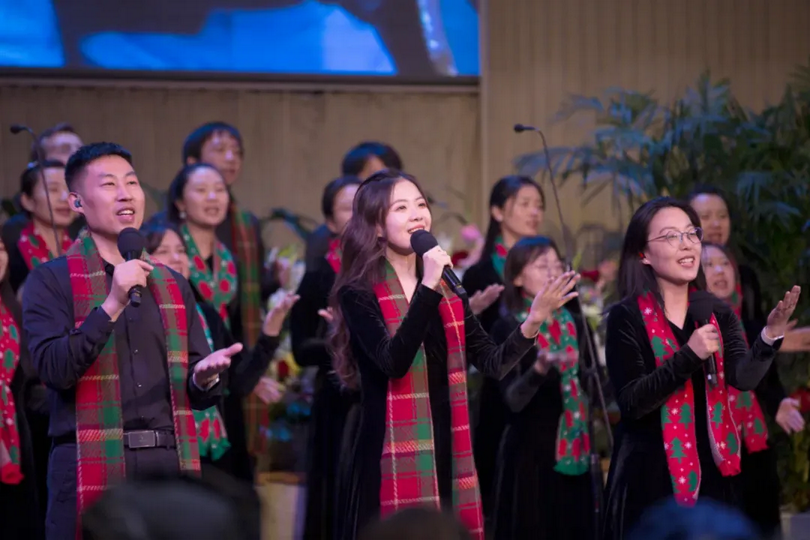In January 2024, my friend and I unintentionally attended a Thursday evening youth fellowship service at a church in Eastern China. I was impressed by the open and free exchanges among the young participants. A year and a half later, I reconnected with the fellowship's leader, Minister L, to share and discuss insights on leading and pastoring young people. The following is an excerpt from the interview with the Gospel Times, an online Chinese Christian newspaper:
Gospel Times: When did you begin leading the youth fellowship? How is it progressing?
Minister L: The church where I serve is located in an urban area of Eastern China and has a history spanning over a century. Currently, the congregation includes more than 1,000 members, with around 300 young people, and over 100 regularly attending the youth fellowship. I began serving at this church in 2010. At that time, the youth fellowship had just over 30 participants and primarily focused on Bible study. Today, the fellowship gathers every Thursday night in a small group mode, guided by the principle of everyone's participation through various activities, including special lectures, testimony sharing, systematic Bible study, and study tours.
Each year, the fellowship sets a vision and shares themed content monthly. For example, during the first week of each month, prominent Christians from diverse fields are invited to share their faith journeys, life stories, and pursuits. The second week focuses on topics such as workplace, faith, and values. The third week features collective worship followed by group sessions led by group leaders, concluding with discussions. In the fourth week, guest speakers share their ministry experiences to inspire young people to observe and engage in ministry. The fifth week is dedicated to group or fellowship birthday celebrations, testifying to God's grace.
Currently, the fellowship comprises 12 groups, supported by 26 group leaders and deputy leaders. The ministry team includes five core coworkers, with 28 individuals serving in worship, library management, and Sunday reception. Additionally, 48 members are engaged in church-organized piano training, sign language classes, and premarital counseling, while 26 group leaders and deputies are enrolled in the Life of Christ training program. Each group takes turns on roles such as leading, greeting, and cleaning during Thursday gatherings, as well as planning special events like birthday celebrations and Trailwalker activities.
Apart from the regular Thursday meetings, fellowship members also participate in a range of additional activities, including mothers' sharing sessions, community youth reading clubs, and entrepreneurial risk management workshops. Furthermore, group leaders are encouraged to take the initiative in leading family altar worship.
Gospel Times: However, around two-thirds of the young people have not yet joined the fellowship. What are the reasons, and have you considered how to offer more pastoral care to them?
Minister L: In my view, several factors contribute to this. First, many young people today are overwhelmed by work and face significant pressure. Second, their lives tend to be highly mobile with frequent changes. And third, the church itself may not have shown them enough care.
Currently, we seek to encourage the youth to commit to the church, small groups, and the fellowship through sermons. We also seek to draw in young people by organizing events such as charity sales and various training sessions. At the same time, we mobilize members of the youth fellowship to reach out and care for those around, creating opportunities for neighbors to share meals and fellowship.
In addition to the mothers' sharing sessions, we plan to launch another book club soon. We will read How to Build a Happy Family and How to Raise Your Children, two books that address areas of deep concern and difficulty for many young people. We aim to invite professionals to give lectures. This approach may encourage young people to attend, helping them gradually build relationships and eventually engage with the fellowship.
The church organizes a wide variety of activities aiming to enrich the Christian life of young people. Though being occupied, they are also full of energy and have a need for entertainment and activities beyond work. Our goal is to ensure that whenever young people are available and in need, the church can offer relevant events for them.
Gospel Times: How can churches attract and retain young people? Some churches focus heavily on worship and praise as a strategy to draw in youth. What is your opinion?
Minister L: In my view, worship should not be the central focus. What truly matters is the cohesion within the group and the interpersonal relationships. Worship may initially draw young people in, but it is the relationships that ultimately matter. For example, if the connection between group leaders and members is strong, it is much easier for members to remain involved. My own home is located within the church building, and the door is usually open. When young people finish work late and haven't eaten, they often come by, cook for themselves, or simply help themselves to leftovers. The relationships between me and the young people, as well as between leaders and members, are close like a family. This allows outsiders to integrate into the community smoothly as drifters who seek belonging.
While modern worship music can certainly be helpful, I don't see it as that important. Taking our Thursday night youth fellowship as an example, we typically spend just 10 to 15 minutes in worship. Over time, members began suggesting the need for a host and the recitation of the Apostles' Creed as a way to deepen faith practice. Every member takes a turn hosting, with a group taking once a month, completing a full cycle over two years. From this rotation, we identify outstanding hosts who are then given opportunities to lead Sunday evening services. Eventually, after further growth and experience, they may even lead Sunday morning services in the main sanctuary. This progression is one of our long-term goals.
The core pastoral focus of our youth fellowship is that everyone serves and everyone is cared for. For instance, nearly 35 members are part of the worship team, and about 20 serve as group leaders or deputy leaders, with some overlapping roles. Others are involved in church receptions, book sales, and even open their homes to host fellow believers.
Gospel Times: As the leader of the fellowship, what do you consider your most important responsibility? How do you define your role?
Minister L: As the fellowship leader, my primary responsibility is to care for the core coworkers, the group leaders, and the deputy leaders. For them, the most vital elements are having role models and nurturing good relationships. It is incorrect to be a hands-off supervisor, but rather to be someone who walks alongside them. Effective companionship involves three key steps: first, demonstrating the work for them to observe; second, guiding them to do it themselves; and third, running alongside them throughout the journey, yet never letting go or allowing them to feel they are bearing the burden alone.
After the first Sunday morning service, we gather for a 30-minute study and sharing, followed by another 30 minutes dedicated to discussion and communication. We then have lunch together at the church.
Before initiating any ministry, we begin with prayer with intention. As pastors, we must serve as role models and build trusting relationships. Once they accept and trust you, they will naturally be more open to listening and following your guidance.
When launching new ministries, we conduct risk assessments in advance and prepare our group leaders by acknowledging the challenges they may face. We also offer solutions and assure them of our continued support throughout the process.
In addition to this guidance, we grant each group autonomy and provide financial support. The church allocates 1,000 yuan per month to each group for activities such as visitation and fellowship gatherings.
Gospel Times: I previously attended a sharing session in one of the youth fellowship groups and found the atmosphere particularly engaging. Have there been any recent developments or changes?
Minister L: In the past, our groups were primarily divided by age. However, we realized that while this method has its advantages, it also presents certain limitations. Younger members need the guidance and influence of more mature ones. Therefore, we are now considering a new grouping approach that brings together members with varying levels of spiritual maturity and different lengths of time attending church. We will make adjustments accordingly.
In addition, we organize special gatherings every one to two months to encourage connection and communication among young people. These include activities such as singles camps and reading clubs.
Gospel Times: During the pandemic, many churches reported a significant decline in membership, particularly among young people. Was your church affected?
Minister L: In fact, our church experienced an increase in membership during the pandemic. This was partly due to the church's location in an urban area that continues to attract new residents. More importantly, it was the church's prompt response that made a difference. In the second week after in-person gatherings were suspended, we quickly mobilized our coworkers to launch online livestream services to provide pastoral care. Where local conditions allowed, believers within the same community gathered to watch the livestream services together. Since many elderly members were not familiar with operating devices, this created opportunities for young people to serve.
Online pastoral care has proven to be an essential supplement to onsite gatherings. For instance, when a young fellowship member relocates to another city, we organize a farewell event and help them connect with a local church community. At the same time, they remain in our fellowship group chat, where we continue to stay in touch, encouraging daily Bible reading check-ins and monthly group discussions. We also let them know they can reach out to the church or group leaders at any time with questions or needs. Additionally, for major fellowship events, such as anniversaries, or whenever they return to the area, we will invite them to gather.
Gospel Times: What is the fellowship's vision for 2025? If you were to use a metaphor to describe the relationship between today's church and young people, what would it be?
Minister L: The vision for this year's fellowship is for every member to lead a small group and for every household to establish a family altar. We are currently encouraging group leaders to take the initiative in conducting family altar worship. The goal is for all group leaders and their deputies to establish family altars from May to September, thereby setting an example for their group members to follow. At present, they are required to hold family worship once a month and check in afterward. From October onward, the aim is to increase the frequency to once a week. The church will offer training and provide the necessary materials in advance. During this process, group members may also be invited to observe, fostering the establishment of family altars throughout the fellowship.
If I were to use a metaphor to describe the relationship between the church and young people today, I would say it is like "a strip of water," which breaks through many obstacles to bring abundant blessings. Young people face immense temptations and pressures, making it difficult to remain steadfast in their faith and committed to service. Their growth requires sacrifice and occurs gradually. The role of the church is to bring hope and blessing to them along this journey.
(Minister L is a pseudonym for safety reasons.)
Originally published by the Gospel Times
- Edited by Karen Luo and translated by Poppy Chan












